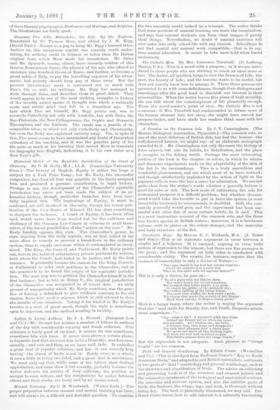Historical Sketch of the Equitable Jurisdiction of the Court of
Chancery. By D. M. Kerly, M.A.., LL.B. (Cambridge University Press.)—The history of English Equity is rather too large a subject for a York Prize Essay; but Mr. Kerly, the successful competitor, has done all that was possible in the limits assigned him, and produced a genuine contribution, to legal history. Strange to say, the development of the Chancellor's equitable Jurisdiction has never yet been made the subject of an ex- haustive history, though particular branches have been care- fully inquired into. Tte beginnings of Equity, it must be confessed, are still involved in obscurity, though the recent pub- lication of the Year-Books of Edward III, has done something to dissipate the darkness. A Court of Equity, it has been often said, would never have boon needed but for the sulkiness and obstinacy of the Common Law Courts in refusing to avail them- selves of the latent possibilities of the "action on the case." Mr. Kerly forcibly opposes this view. The Chancellor's power, he says, arguing from the early reports, was at first called in far more often to remedy or prevent a breakdown in the ordinary system, than to supply omissions which it contemplated as recog- nised. The King, the Council, and Parliament, Mr. Kerly points out, were in the habit of entertaining private petitions for redress, both where the Courts had failed to do justice, and in the first instance. It gradually became the custom for the King, Council, or Parliament to refer such petitions to the Chancellor, and in this practice is to be found the origin of his equitable jurisdic- tion. The next step was to petition the Chancellor himself in the first instance ; but as late as Henry V., the original jurisdiction of the Chancellor was recognised as of recent date. An early ground of unpopularity which Mr. Kerly mentions, was the prac- tice of forcing a defendant to give evidence contrary to the old maxim, Istenio debt prodere seipsum, which is still allowed to close the mouths of our criminals. Taking it for what it is, Mr. Kerly's treatise is a work of great merit, though the style is sometimes open to objection, and the method wanting in lucidity.














































 Previous page
Previous page